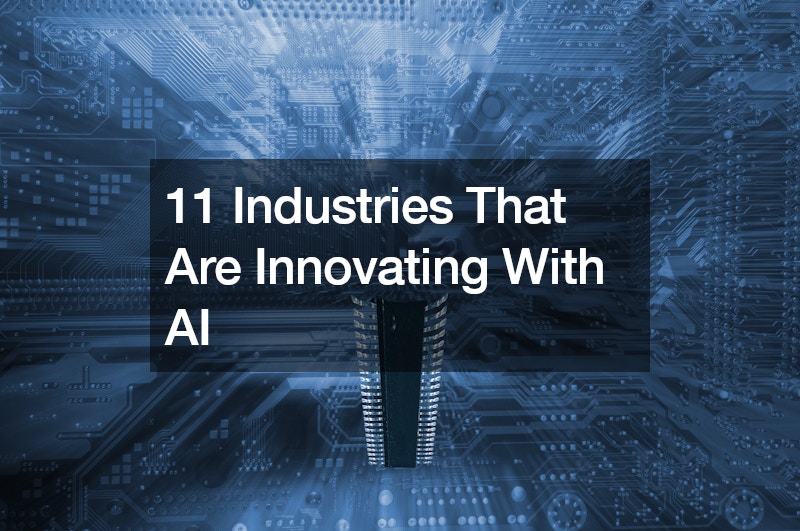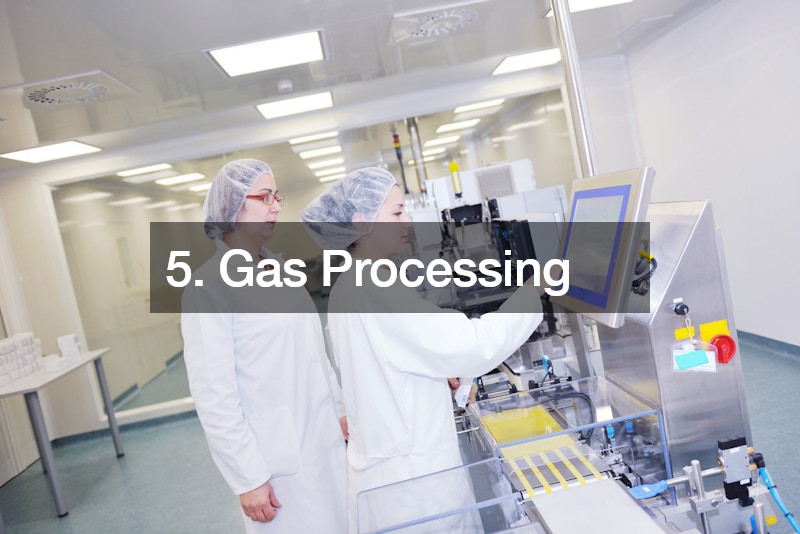
In today’s rapidly evolving world, technological advancements are reshaping various industries, revolutionizing the way businesses operate. One such innovation that is gaining prominence is artificial intelligence (AI), which is being integrated into different sectors to enhance efficiency and productivity. In this article, we will explore the impact of AI in a diverse range of industries.
1. Dentistry
The field of pediatric dentistry has greatly benefited from AI, with advanced technologies aiding in diagnostics and treatment planning. AI-powered tools can analyze patient data to provide personalized care, improving outcomes and reducing errors. Additionally, AI in dentistry offers virtual consultations and treatment simulations, enhancing patient experience and engagement.
AI algorithms can assist dentists in detecting early signs of oral diseases, leading to timely interventions and preventive measures. The integration of AI in dental practices streamlines administrative tasks, such as appointment scheduling and billing, optimizing practice management. Overall, AI in dentistry holds great promise in transforming the oral healthcare landscape.
Innovative AI applications in dentistry include teledentistry platforms, robotic-assisted surgeries, and AI-driven robotic workflows for dental procedures. These advancements not only enhance the efficiency of dental practices but also improve patient outcomes and satisfaction. By harnessing the power of AI, the future of dentistry is poised for groundbreaking advancements and improved oral health for all.
2. Roadwork
With the increasing demand for efficient road infrastructure, AI technologies have been instrumental in enhancing roadwork operations. Parking lot striping, a crucial aspect of road maintenance, has benefitted from AI-driven solutions that optimize line marking processes and ensure compliance with safety regulations. By utilizing AI algorithms, roadwork crews can efficiently plan striping patterns and execute precise markings, improving traffic flow and pedestrian safety.
AI in roadwork also facilitates predictive maintenance strategies, enabling authorities to address potential issues before they escalate into costly repairs. By analyzing data from sensors and cameras installed on roads, AI systems can detect signs of wear and deterioration, prompting timely maintenance interventions. Additionally, AI-enabled traffic management tools contribute to congestion reduction and efficient utilization of road networks, enhancing overall transportation infrastructure.
Roadwork contractors can leverage AI technologies such as machine learning algorithms and autonomous vehicles to streamline construction processes and ensure quality outcomes. By embracing AI-driven solutions, the roadwork industry can achieve greater operational efficiency, cost savings, and enhanced safety standards. The integration of AI in roadwork signifies a paradigm shift in infrastructure development, paving the way for smarter, more sustainable transportation systems.
3. Plastic Surgery
The field of plastic surgery has seen remarkable advancements through the integration of AI technologies, revolutionizing patient care and surgical outcomes. Plastic surgeons are leveraging AI tools to enhance preoperative planning and simulation, enabling more accurate predictions of surgical results and improved patient satisfaction. AI algorithms can analyze facial features and anatomy to recommend personalized treatment plans, enhancing the precision and effectiveness of aesthetic procedures.
Moreover, AI applications in plastic surgery encompass robotic-assisted surgeries, image-guided interventions, and virtual consultations, offering patients innovative treatment options and optimal results. By harnessing the power of AI, a plastic surgeon can achieve exceptional aesthetic outcomes while minimizing risks and complications. Additionally, AI-driven postoperative monitoring tools enable remote patient care and timely interventions, ensuring smooth recovery and satisfying surgical experiences.
AI in plastic surgery also extends to research and development, with algorithms facilitating data analysis, surgical simulations, and outcome predictions. By utilizing AI technologies, plastic surgeons can stay at the forefront of innovation, delivering cutting-edge treatments and enhancing patient care standards. The integration of AI in plastic surgery underscores a new era of precision medicine and personalized healthcare, where technology empowers practitioners to achieve remarkable results and improve patient well-being.
4. Flooring
Commercial epoxy flooring has undergone a transformation with the incorporation of AI technologies, offering enhanced durability, aesthetics, and performance in various commercial settings. AI-driven solutions in commercial flooring encompass predictive maintenance, real-time monitoring, and automated workflows, ensuring long-lasting and resilient flooring systems. By analyzing environmental factors and usage patterns, AI algorithms can optimize floor installation and maintenance processes, maximizing longevity and minimizing downtime.
AI in flooring also facilitates smart design choices and customization options, allowing businesses to create unique and innovative flooring solutions tailored to their specific needs. By leveraging AI-powered tools for material selection and design simulations, commercial epoxy flooring providers can deliver exceptional products that meet client preferences and exceed industry standards. Additionally, AI-driven maintenance strategies enable proactive care and timely interventions, preserving the integrity and appearance of commercial floors.
Innovative AI applications in commercial epoxy flooring include self-healing technologies, self-cleaning surfaces, and energy-efficient flooring solutions, enhancing sustainability and cost-effectiveness. By embracing AI-driven advancements, businesses can achieve greater efficiency, durability, and aesthetic appeal in their flooring systems, providing a competitive edge in the commercial real estate market. The integration of AI in flooring signifies a transformative shift towards intelligent and responsive building materials that cater to evolving business demands and sustainability goals.
5. Gas Processing
The field of gas processing has experienced significant advancements with the integration of AI technologies, enhancing efficiency, safety, and sustainability in gas production and distribution. Molecular sieve technology, such as Dryamax, is a key component in gas processing operations and has benefitted from AI-driven solutions that optimize adsorption and separation processes. By utilizing AI algorithms, gas processing plants can achieve higher purity levels, increased capacity, and reduced energy consumption, improving overall operational performance.
AI in gas processing also enables predictive maintenance strategies, facilitating early detection of equipment malfunctions and process abnormalities. By integrating sensors and IoT devices with AI systems, gas processing facilities can monitor plant operations in real-time, identify inefficiencies, and preemptively address potential issues. Additionally, AI-driven process optimization tools streamline production workflows, lower production costs, and enhance product quality, ensuring compliance with industry standards and regulations.
Gas processing professionals can leverage AI technologies such as machine learning models, digital twins, and predictive analytics to enhance operational decision-making and resource allocation. By harnessing the power of AI-driven solutions, the gas processing industry can achieve greater efficiency, reliability, and sustainability in gas production processes. The integration of AI in gas processing represents a significant leap towards intelligent and automated operations that optimize resource utilization and minimize environmental impact.
6. Manufacturing
Manufacturing tool design and production have been revolutionized by AI technologies, enabling manufacturers to enhance productivity, quality, and innovation in manufacturing processes. AI-powered tools in manufacturing encompass design optimization, predictive maintenance, and automated production planning, streamlining workflows and reducing lead times. By leveraging AI algorithms for product development and testing, manufacturers can customize tools to meet specific requirements, improving performance and durability.
AI in manufacturing also facilitates predictive analytics for demand forecasting, inventory management, and supply chain optimization, enabling manufacturers to respond to market fluctuations and customer demands effectively. By integrating AI-driven solutions for resource allocation and production scheduling, manufacturers can achieve just-in-time manufacturing, lower inventory costs, and enhance operational efficiency. Additionally, AI-enabled quality control systems ensure consistent product quality, reducing defects and rework in manufacturing processes.
Innovative AI applications in manufacturing include collaborative robotics, digital twinning, and smart manufacturing systems, transforming traditional production methods into agile and intelligent workflows. By embracing AI-driven advancements, manufacturers can achieve greater flexibility, scalability, and competitiveness in the global market. The integration of AI in manufacturing signifies a shift towards Industry 4.0, where intelligent technologies drive unprecedented advancements in automation, customization, and sustainability.
7. Point of Sale Systems
Automotive point of sale software has experienced a paradigm shift with the integration of AI technologies, offering automotive dealerships advanced features for sales, inventory management, and customer relations. AI-driven point of sale systems in the automotive industry encompass predictive analytics, customer behavior analysis, and personalized marketing campaigns, optimizing sales processes and increasing customer engagement. By leveraging AI algorithms for sales forecasting and inventory optimization, automotive dealers can enhance profitability and reduce costs.
AI in automotive point of sale software also facilitates real-time reporting and data analytics, enabling dealerships to make informed decisions, track performance metrics, and identify growth opportunities. By utilizing AI-powered tools for customer segmentation and targeted promotions, automotive dealers can tailor marketing strategies to individual preferences, driving sales and fostering brand loyalty. Additionally, AI-driven customer service solutions enhance the overall shopping experience, providing personalized recommendations and seamless transactions.
Innovative AI applications in automotive point of sale software include virtual showrooms, digital sales assistants, and omnichannel integration, revolutionizing the way dealerships engage with customers and facilitate sales transactions. By embracing AI-driven solutions, automotive dealers can stay ahead in a competitive market, deliver exceptional customer service, and optimize operational efficiency. The integration of AI in automotive point of sale systems signifies a digital transformation in the automotive retail sector, where technology empowers dealers to enhance customer satisfaction and drive business growth.
8. Septic Cleaning
Septic tank cleaning services have been revolutionized by AI technologies, offering enhanced efficiency, safety, and sustainability in septic system maintenance. AI-driven solutions in septic cleaning encompass predictive maintenance, remote monitoring, and automated scheduling, ensuring timely and effective septic tank servicing. By utilizing AI algorithms for data analysis and system monitoring, septic cleaning professionals can optimize service routes, reduce response times, and minimize environmental impact.
AI in septic tank cleaning also facilitates smart sensor technologies and IoT devices for real-time monitoring of septic systems, enabling early detection of leaks, blockages, and efficiency issues. By integrating AI-powered predictive maintenance tools, septic cleaning companies can proactively address septic system problems, preventing costly repairs and environmental contamination. Additionally, AI-driven scheduling and dispatching systems streamline service operations, improving service delivery and customer satisfaction.
Innovative AI applications in septic tank cleaning include autonomous drones for system inspection, predictive analytics for septic system health, and remote troubleshooting for maintenance issues. By embracing AI-driven advancements, septic cleaning companies can optimize operational workflows, reduce service downtime, and enhance service quality standards. The integration of AI in septic tank cleaning signifies a transformative shift towards automated and data-driven maintenance strategies that ensure the longevity and performance of septic systems.
9. Home Remodeling
Home remodeling contractors are leveraging AI technologies to enhance project planning, design, and execution, offering homeowners innovative solutions for home improvements and renovations. AI-powered tools in home remodeling encompass virtual design simulations, material selection algorithms, and project management software, enabling contractors to deliver customized and high-quality remodeling projects. By utilizing AI algorithms for cost estimation and resource planning, contractors can ensure projects stay within budget and are completed on schedule.
AI in home remodeling also facilitates augmented reality visualization tools, enabling homeowners to preview design options and make informed decisions about remodeling projects. By integrating AI-driven project management platforms for communication and collaboration, contractors can streamline project workflows, enhance productivity, and improve client satisfaction. Additionally, AI-enabled quality control systems ensure that remodeling projects meet industry standards and exceed client expectations.
Innovative AI applications in home remodeling include smart home integrations, energy-efficient solutions, and sustainable building materials, transforming traditional home renovation practices into cutting-edge and eco-friendly projects. By embracing AI-driven advancements, home remodeling contractors can offer homeowners sustainable and innovative solutions that enhance property value and overall livability. The integration of AI in home remodeling signifies a shift towards intelligent and data-informed renovation practices that cater to modern homeowner preferences and sustainability goals.
10. Plumbing Software
Plumbers are incorporating AI technologies into their operations to improve efficiency, customer service, and business management in the plumbing industry. AI-driven plumbing software solutions encompass scheduling optimization, predictive maintenance, and customer relationship management tools, enabling plumbers to streamline service delivery and enhance client satisfaction. By leveraging AI algorithms for job assignments and dispatching, plumbing professionals can optimize service routes, reduce response times, and increase service capacity.
AI in plumbing software also facilitates data analytics for performance tracking, inventory management, and cost optimization, empowering plumbers to make data-driven decisions and improve operational efficiency. By utilizing AI-powered customer service platforms for appointment scheduling and communication, plumbers can provide personalized and responsive services to clients, fostering long-term relationships and loyalty. Additionally, AI-driven preventive maintenance tools assist plumbers in identifying potential issues before they escalate, reducing downtime and emergency repair costs.
Innovative AI applications in plumbing software include smart leak detection systems, predictive pipe health monitoring, and automated invoice generation, revolutionizing workflow efficiency and customer service quality. By embracing AI-driven advancements, plumbers can increase service reliability, optimize resource allocation, and improve customer satisfaction rates. The integration of AI in plumbing software signifies a digital transformation in the plumbing industry, where technology empowers professionals to deliver exceptional services and maintain competitive advantage.
11. Marketing
In the realm of marketing, AI technologies are reshaping strategies, campaigns, and consumer interactions, offering businesses innovative tools for personalized engagement and data-driven decision-making. AI-driven marketing solutions encompass predictive analytics, customer segmentation, and campaign automation, enabling marketers to optimize targeting, messaging, and ROI. By leveraging AI algorithms for data analysis and trend forecasting, marketers can create more effective and efficient marketing strategies that resonate with target audiences.
AI in marketing also facilitates real-time personalization and omnichannel integration, enabling businesses to deliver relevant and timely content to customers across multiple touchpoints. By utilizing AI-powered chatbots and virtual assistants for customer engagement and support, marketers can enhance customer experiences and drive conversion rates. Additionally, AI-enabled customer analytics platforms help marketers understand consumer behaviors, preferences, and purchase patterns, enabling them to tailor offerings and promotions to individual needs.
Innovative AI applications in marketing include machine learning algorithms for content optimization, predictive modeling for campaign performance, and AI-driven A/B testing for ad effectiveness. By embracing AI-driven advancements, marketers can achieve greater campaign success, customer engagement, and brand loyalty. The integration of AI in marketing signifies a shift towards data-driven and customer-centric marketing practices that empower businesses to thrive in a competitive landscape.
The integration of AI technologies across various industries is driving remarkable advancements in efficiency, productivity, and innovation. From dentistry and roadwork to plastic surgery and flooring, AI is transforming traditional practices and setting new standards for quality and performance. By harnessing the power of AI-driven solutions, businesses can optimize operations, enhance customer experiences, and stay ahead of the competition in today’s fast-paced digital economy. As AI continues to evolve and expand its capabilities, industries will witness further transformations that revolutionize how work is done and services are delivered. With the right strategies and investments in AI, businesses can unlock endless possibilities for growth, sustainability, and success in the modern era.




